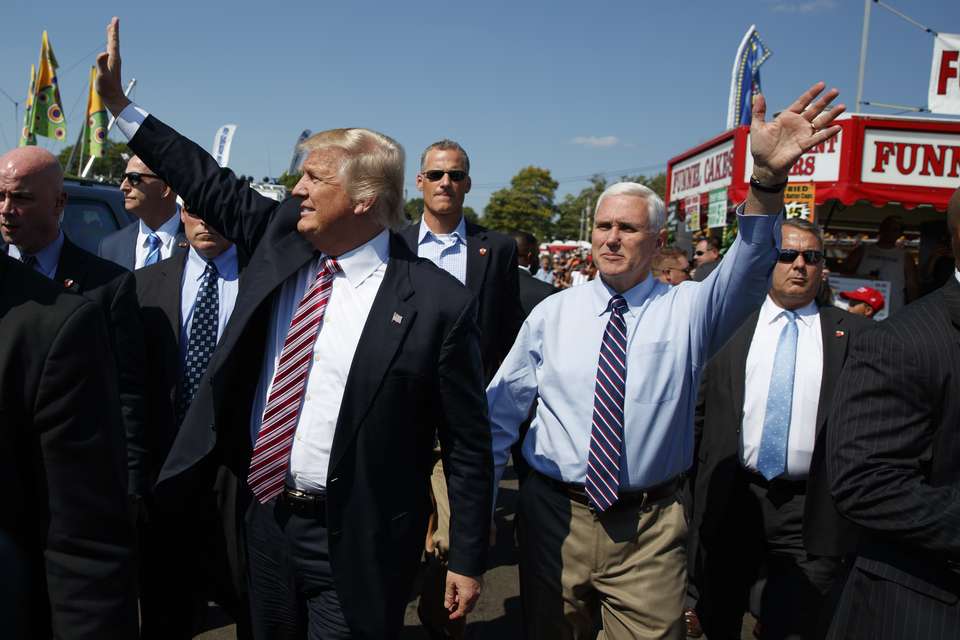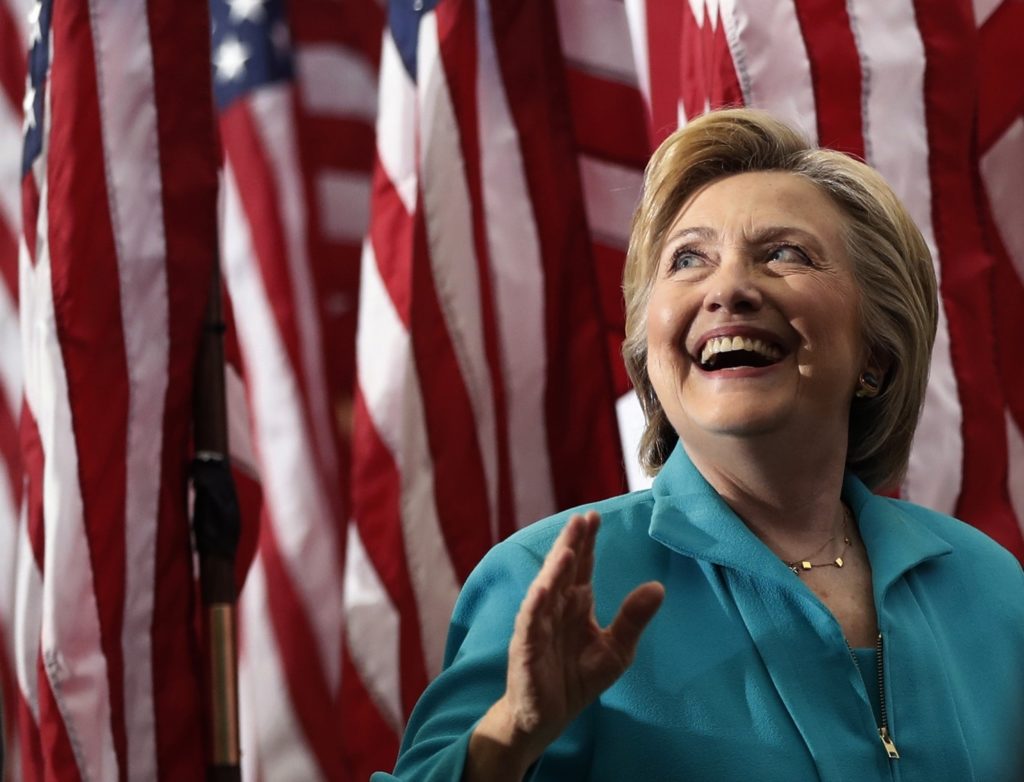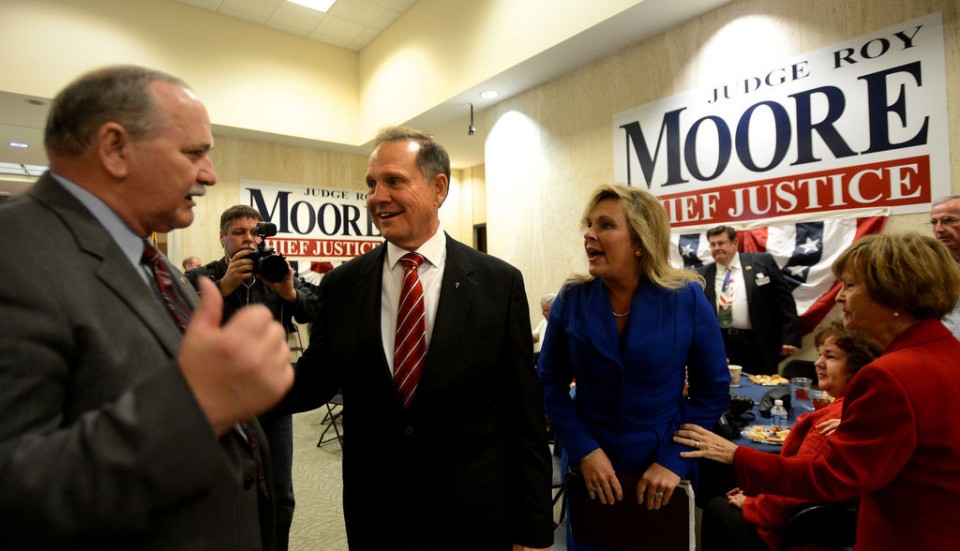Donald Trump and Hillary Clinton turn to battleground states in the South

With Labor Day behind them, Donald Trump and Hillary Clinton are pushing ahead in top presidential battlegrounds in the South. Trump, the Republican nominee, is set to campaign in Virginia and North Carolina on Tuesday, two critical states in his path to the presidency. Clinton, the Democrat, is campaigning in Florida in search of an advantage in the nation’s largest swing state. A Clinton victory in Florida would make it virtually impossible for Trump to overcome her advantage in the race for 270 electoral votes. The day before in swing state Ohio, Trump softened his stance on immigration while Clinton blasted Russia for suspected tampering in the U.S. electoral process. In a rare news conference aboard her new campaign plane, Clinton said she is concerned about “credible reports about Russian government interference in our elections.” “We are going to have to take those threats and attacks seriously,” Clinton told reporters traveling with her from Ohio to Illinois. Clinton’s comments follow reports that the Russian government may have been involved in the hacking of Democratic National Committee emails just days before the party’s national convention. The emails, later revealed by WikiLeaks, showed some DNC officials favoring Clinton over her primary opponent, Bernie Sanders — who has since endorsed Clinton for president. She said Russian President Vladimir Putin appears “quite satisfied with himself” and said Trump “has generally parroted what is a Putin-Kremlin line.” Meanwhile, Trump extended a rare invitation to journalists to accompany him on his private plane from Cleveland to Youngstown, Ohio. The billionaire businessman appeared to shy away from his hard-line vow to block “amnesty” for immigrants in the country illegally. Any immigrants who want full citizenship must return to their countries of origin and get in line, he told reporters — but he would not rule out a pathway to legal status for the millions living in the U.S. illegally, as he did in a long-awaited policy speech last week. “We’re going to make that decision into the future,” Trump said. Clinton powered through a coughing fit at a Labor Day festival at a Cleveland park, sharply criticizing Trump’s recent trip to Mexico as “an embarrassing international incident.” Unwilling to allow Trump to modify his immigration stances, she said his address later that night in Arizona amounted to a “doubling down on his absurd plan to send a deportation force to round up 16 million people.” “He can try to fool voters into thinking somehow he’s not as harsh and inhumane as he seems, but it’s too late,” Clinton said. The former secretary of state flatly said “No,” when asked in an ABC News interview whether she’d be willing to accept the Mexican president’s invitation to visit the country, as Trump did last week. “I’m going to continue to focus on what we’re doing to create jobs here at home,” Clinton said. Earlier in the day, Trump attacked Clinton’s energy level, noting she hasn’t followed his aggressive traveling schedule and questioning whether she had the stamina to help bring jobs back to America. “She doesn’t have the energy to bring ’em back. You need energy, man,” Trump told reporters. He added, “She didn’t have the energy to go to Louisiana. And she didn’t have the energy to go to Mexico.” Clinton’s 25-minute question-and-answer session was her first extensive availability with reporters since early December. Beyond Russia, she answered questions about the ongoing controversy surrounding her use of a private email server while secretary of state, which Trump has used to cast doubt over her ability to protect classified information. “I take classification seriously,” she said. While Labor Day has traditionally been the kickoff to the fall campaign, both Clinton and Trump have been locked in an intense back-and-forth throughout the summer. The start of full-fledged campaigning opens a pivotal month, culminating in the first presidential debate Sept. 26 at Hofstra University in Hempstead, New York. Polls show Trump trailing Clinton in a series of must-win battleground states, meaning the debates could be his best chance at reorienting the race. Trump told reporters he does plan to take part in all three presidential debates, joking that only a “hurricane” or “natural disaster” would prevent him from attending. Republished with permission of the Associated Press.
What’s on Hillary Clinton’s to-do list before Election Day?

Hillary Clinton will celebrate Labor Day with an edge over rival Donald Trump in any number of the most competitive states, even as she struggles with the challenge of sealing the deal with large groups of voters who consider her dishonest and untrustworthy. Clinton’s experience as secretary of state and her handle on domestic policy make her the favorite in three presidential debates beginning later this month. She has appeared in more than 30 as a presidential candidate in 2008 and 2016. But she still has work to do. A look at Clinton’s Labor Day to Election Day to-do list: DOMINATE THE DEBATES Millions of voters will watch the debates, which offer her an opportunity and a challenge. She needs to prepare for a candidate who’s the most unpredictable nominee in decades. She also needs to prevent Trump from using the televised forums to present himself as a plausible commander in chief, and from turning them into referendums on President Barack Obama’s two terms and Clinton’s decades in politics. Clinton acknowledges that the debates could be pivotal. She told donors last weekend, “Somebody said to me, ‘Well, remember, there’ll be a lot of people watching.’ One hundred million people watching. And 60 million will be paying attention to the campaign for the first time.” CHART A PATH TO 270 Clinton has an edge in most of the highly contested states, the roughly dozen or so where the election will be decided. Her campaign is trying to keep open as many paths as possible through those states to reach the decisive 270 electoral votes needed to win. She enters the fall with a decided advantage, both in terms of history and in this year’s campaign. If Clinton can hold onto the set of states that every Democratic presidential nominee has won since 2000, she starts with 242 electoral votes. Beyond those states, preference polls show her ahead in Virginia and Colorado, and competing in close contests in North Carolina, Florida and Ohio. Applying pressure on Trump, Clinton is advertising in GOP-leaning Arizona and in an Omaha, Nebraska, congressional district. If Clinton can keep open as many routes to victory, she will make it difficult for Trump to chart a way to 270. That will make it hard for him to convince fellow Republicans who are worried about maintaining their congressional majorities that he can win. EXPECT THE UNEXPECTED Clinton’s campaign is bracing itself for some type of ‘October surprise” — an unexpected event that requires the nominee to adjust in the pressure-cooker of the campaign’s final days. Clinton must be able to deftly deal with such a development, and there are plenty of contenders on the horizon. The State Department is expected to release some of the 15,000 emails from Clinton’s time there that have yet to be made publicly available. WikiLeaks has threatened to release more damaging information before the end of the election. She’ll need to make sure any new revelations don’t further damage the public’s view of Clinton, which isn’t particularly strong for a candidate seen as ahead on Labor Day. TURNOUT, TURNOUT, TURNOUT Clinton’s campaign needs to maximize voter turnout among members of the “Obama coalition” — the legions of black, Latino, unmarried women and young voters who powered him to two decisive victories. Trump has sought in recent days to turn around his dismal standing among minorities. But the negative tone of the campaign could dampen turnout and make Clinton’s task more difficult. Clinton also aims to make the most of early voting in a number of critical states, replicating a strategy that worked well for Obama. She will have plenty of help: Obama and Vice President Joe Biden are hitting the road on her behalf and she can also rely on her husband, former President Bill Clinton. TRUSTWORTHINESS Questions about Clinton’s honesty and trustworthiness have dogged her throughout the campaign and she can ill afford to have more voters view her in a negative way. Her saving grace during the campaign has been Trump’s high negative ratings, untrustworthiness and penchant for saying provocative things that have turned off many voters. But more revelations about her private email server or the Clinton Foundation could reinforce the perception that she’s not trustworthy. On Friday, the FBI released notes from its investigation of her email use as secretary of state. It’s the kind of day Clinton needs to avoid. Even if she wins in November, this is a problem could haunt Clinton in the White House. That’s why she needs to start chipping away at her trust deficit now, so that if elected, she will have some public goodwill as she tries to lead the nation and work with Congress. Clinton could find it difficult to enact her agenda if questions about her honesty linger as president. Republished with permission of the Associated Press.
Panel sends Alabama chief justice’s ethics case to trial

A state judicial panel on Monday refused to dismiss an ethics complaint against Alabama Chief Justice Roy Moore, saying that Moore will go to trial in September on accusations that he urged 68 probate judges to defy the federal courts on same-sex marriage. The Alabama Court of the Judiciary, a state panel that disciplines judges, refused dueling requests to either dismiss the complaint against Moore outright or go ahead and remove him from office. Chief Judge Michael Joiner said the case will go to trial Sept. 28. The panel of nine judges will hear the case and decide whether Moore violated judicial ethics and if so, what punishment he will face. The decision came down shortly after the conclusion of a 60-minute hearing in which Moore was alternately portrayed as a politician on a mission to block gay couples from marrying in Alabama or a judge who was merely trying answer questions from confused probate judges. Moore — who was ousted from office by the court in 2003 for refusing to remove a Ten Commandments monument from the state judicial building — could be removed as chief justice for a second time. “We are here to talk about Chief Justice Roy Moore and his repeated refusal to follow the rule of law,” John Carroll, a former federal magistrate representing the Judicial Inquiry Commission, told the court. Carroll said Moore abused his power as chief justice to promote a private agenda against same-sex marriage. The complaint stems from a Jan. 6 memo he sent probate judges. Moore wrote that a March order from the state Supreme Court to refuse marriage licenses to gay couples remained in full force and effect. The order came even though the U.S. Supreme Court had effectively legalized same-sex marriage nationwide six months prior and a federal judge said Alabama should follow that decision. A lawyer for Moore said the chief justice was only clarifying the status of the state injunction that was issued in March because probate judges were asking questions about it. “The probate judges were flapping in the wind. They were wondering what to do,” his lawyer, Mat Staver, told the court. Moore’s order was merely a legal “truism” that the order had not been lifted by the state court, he argued. Staver, in defending Moore, repeatedly emphasized a section of the January order where Moore told the probate judges that he was not at “liberty to provide any guidance to Alabama probate judges on the effect of (the U.S. Supreme Court ruling) on the existing orders of the Alabama Supreme Court.” Carroll countered that Moore’s intent was clear: to try to urge probate judges to fight against same-sex marriage. Moore acted on his own by sending the order after unsuccessfully urging his fellow justices to take some action regarding the March order in the wake of the U.S. Supreme Court decision, something pointing out by both sides in the hearing. The Monday hearing took on some of the theater and spectacle that accompanied the 2003 dismissal with passionate protests outside the court. Moore’s supporters and opponents held dueling rallies outside the court building ahead of the hearing, at times standing within a few feet of each other as they chanted and waved competing signs such as “No Moore” or “Judge Moore is right.” Moore entered the packed courtroom to applause from his supporters. After the hearing, he spoke to a sign-waving crowd outside, saying there is “no evidence” he broke judicial ethics and that he never told judges what to do. “They said I tried to influence them. I said it’s their decision,” Moore said. Moore said the complaint was filed against him by people who “don’t want anybody opposing any agenda of the homosexual movement.” The Southern Poverty Law Center, a civil rights legal advocacy group, filed the complaint against Moore that led to the ethics charges, and its director said Moore was clearly urging the judges to defy the courts on gay marriage and was now trying to “save his skin by playing word games.” “Alabama is a great state and deserves better than a chief justice who thinks he is above the law. We’ve said it many times. He acts as if he is the ayatollah of Alabama,” SPLC President Richard Cohen said after the hearing. Ambrosia Starling, the stage name of a small-town Alabama drag queen, was among the speakers against Moore. “We lost the war between the states. That means the Supreme Court holds the final authority over jurisdiction of law,” Starling drawled. Linda Chasom drove three hours from Georgia to attend the rally in support of Moore. She said she thought Moore was being persecuted for his conservative Christian beliefs. “My family is being persecuted. Judge Roy Moore is part of my family as a believer,” Chasom said. Republished with permission of the Associated Press.


